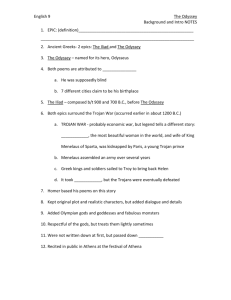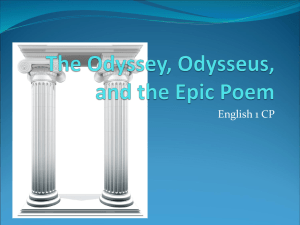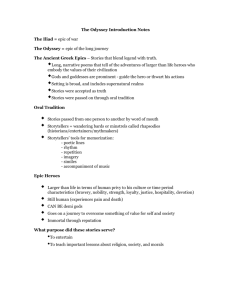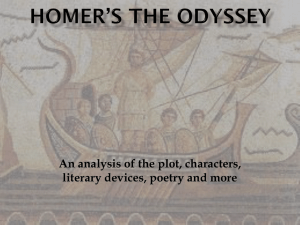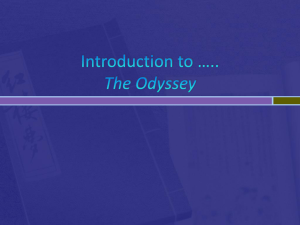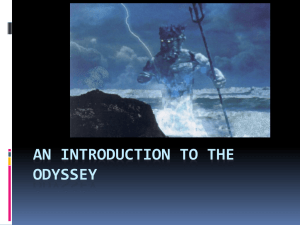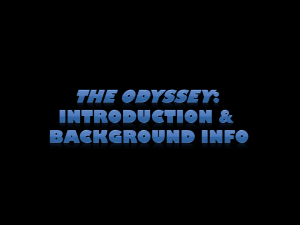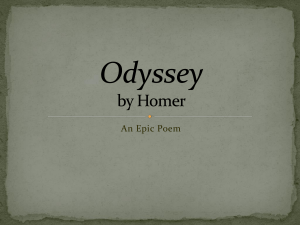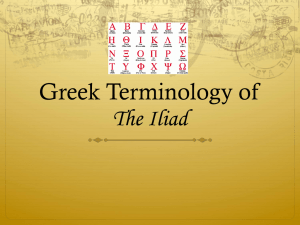Troy
advertisement
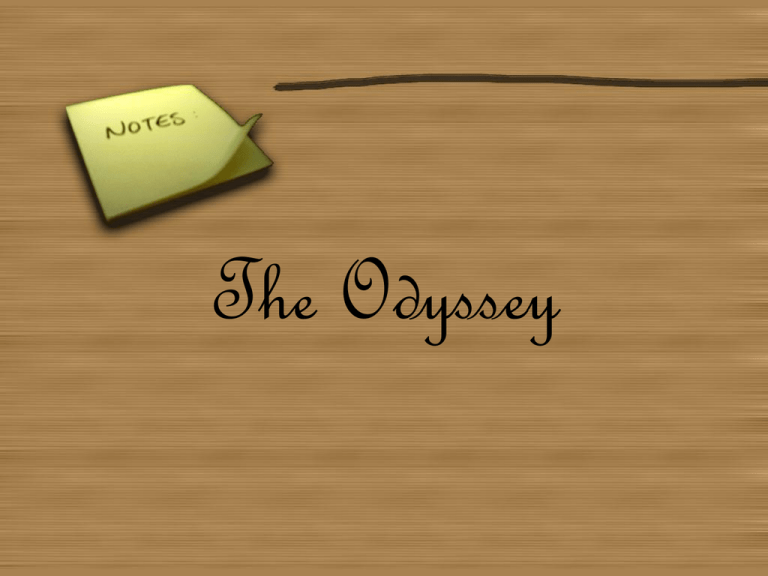
The Odyssey Epic “An epic is an encyclopedia of the manners, customs, and values that bind a whole civilization together.” W.T. Jewkes But the textbook definition is… • A long narrative poem about the adventures of a hero who embodies the values of his culture. Characteristics of an Epic • The protagonist is a physically impressive hero of national or historical importance who goes on a quest or journey and is glorified at the end of the work. • The setting involves much of the known physical world and sometimes the land of the dead. • The story is rooted in a specific culture and society. What Makes an Epic Hero? •Noble birth •Superior strength and intelligence •Embodies the values of his culture •Possesses a flaw •Goes on a journey or quest •Overcomes obstacles •Continually put through tests •Travels to places most people cannot go •Assisted by divine being(s) •Attains immortality The Style of an Epic Epics begin in medias res, literally translated it means “in the middle of things”… the audience is thrown into the story and the missing pieces are filled in using literary techniques like extended flashbacks, multiple story lines, and a variety of narration techniques. Epics contain a unique combination of … • History (Trojan War) • Legend (an unverified story handed down by generations and generally accepted as factually based) • Myth (stories that use fantasy to express ideas about life that cannot be expressed easily in realistic terms… the gods, creatively woven tales, fantastical creatures) How is an Epic a form of Poetry? The earliest forms of “story telling” were sung tales. Our literary tradition began as an oral tradition. To help people remember long stories, rhapsodes combined these stories with a “beat”… more like a chant. Is it easier for you to remember a 3 minute song or a 3 minute speech? Poetic Devices Unique to the Epic Epithets (ˈe-pə-ˌthet ) • • • A descriptive phrase that is used to characterize a person or thing. An epithet would be used in place of a person’s name to avoid too much repetition and to give life to the character with added description. In a long tale this was a subtle way to remind the audience what/who a character is. One of the most common epithets in the Odyssey is “Gray-eyed goddess” (Athena) Others include “swift-footed Achilles” or “rosy-fingered dawn” Poetic Devices Unique to the Epic Homeric Simile • • An extended comparison using heroic or epic events and compares them to easily recognizable items "He pushed aside the bushes, breaking off with his great hand a single branch of olive, whose leaves might shield him in his nakedness, so came out rustling like a mountain lion, rain-drenched, wind-buffeted, but in his might at ease, with burning eyes - who prowls among the herds or flocks, or after game, his hungry belly taking him near stout homesteads for his prey." Homer Not this one---- • He was a well known storyteller from ancient Greece • By trade, he was a rhapsode (literally a “singer of tales”) – These men were the historians and entertainers as well as the myth-makers of their time – They traveled from place to place singing of recent events, heroes, or gods/goddesses • Credited with telling the epics the Iliad and the Odyssey The Iliad • • • An epic… this is Homer’s account of the Trojan War This epic is set in the final weeks of the 10th year of the Trojan War The Greeks won the war, reduced the city of Troy to smoldering ruins, and butchered all the inhabitants, except for those they took as slaves back to Greece. The Trojan War The war began when the goddesses Athena, Hera and Aphrodite, bribed the prince of Troy, Paris, to name one of them as the most fair. He was offered power, wealth or the most beautiful woman as bribes. He chose Aphrodite as the most fair and in return, she gave him the most beautiful woman, Helen of Troy. The problem was that Helen was already married. Her husband, King Menelaus (men-uh-lay'-uhs) of Sparta and his brother Agamemnon (ag-uh-mem'-nahn), king of Mycenae (mahysee-nee), led an expedition of Achaean (ə-ˈkē-ən) troops (Greeks) to Troy and thus began the 10 year war. After the deaths of many Greek heroes, including the Achaeans Achilles and Ajax, and the Trojans Hector and Paris, the city fell after Odysseus’s Trojan Horse trick caught the Trojans off guard. The Odyssey This epic tells of the adventures of a famous Greek hero, Odysseus as he makes his way Home to Ithaca from the Trojan War. This narrative has everything the ancient Greek could have wanted in a story…it was suspenseful, action-packed, thought-provoking, romantic, scary, funny, gory, and didactic (taught lessons) all at once! Odysseus: A Hero in Trouble Before the Trojan War, Odysseus….. - married the beautiful and faithful Penelope - had one son, Telemachus When called to serve in the Trojan War, Odysseus…… - pretended to be insane so he wouldn’t have to go (he dressed as a peasant, plowed his field, and sowed it with salt) - revealed his sanity to save his son’s life (who was placed in front of the plow) The Wooden Horse Trick During the Trojan War, Odysseus - performed extremely well as a soldier and commander - thought of the famous wooden-horse trick that lead to the defeat of Troy Structure of the Odyssey The story begins with Telemachus, Odysseus’s son. Telemachus is searching for his father because he…. - is being threatened by rude, powerful men who want to marry his mother and rob Telemachus of his inheritance - needs his father to return home and restore order The Structure of the Odyssey Readers learn that Odysseus…. - is stranded on an island, longing to get home - has been gone for twenty years—he has spent ten years at war and ten years trying to get home - is in the middle of a midlife crisis and searching for inner peace Troy Troy was located in what is now Turkey Journey Where is the theme of the journey found in Western literature? Journey - Fairy tales novels, such as The Incredible Journey, Moby-Dick, and The Hobbit movies, such as The Wizard of Oz and Star Wars
